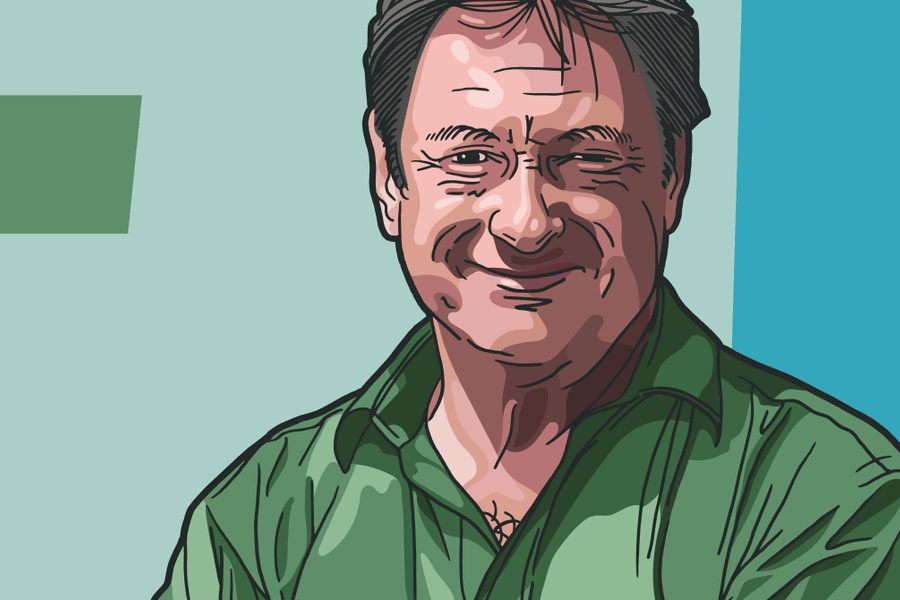Sitting alongside the banks of the river Test, in the glorious gardens of Bere Mill, in Whitchurch, Hampshire, seemed an appropriate setting to be addressed by the face of British gardening. However, despite the tranquil environment, the opening remarks which highlighted many of Alan’s achievements left the audience exhausted. We heard about his forty gardening books, nine novels, fifty charities of which he is a patron, occasional bell ringer, radio host for Classic FM and renowned presenter of TV shows from Ground Force to Songs of Praise. It left us wondering how we’d ever allowed ourselves to feel busy.
But how did the boy from Ilkley who left school with just one O-level reach the dizzy heights of having a waxwork of himself in Madame Tussauds – where we’re told staff have to wipe off the lipstick more often than not!
It seems it was in the blood. He wittily gave us a potted history of his route to perpetually mucky hands. He was a sensitive flower, no pun intended apparently, who didn’t love school, but coped. This is where he met one of his main architects, a teacher called Harry Rhodes who sold succulents in church bazaars. Young Titchmarsh had the over-enthusiasm of a puppy as a child, whom most teachers crushed with the yell “Titchmarsh sit down.” But Harry was the one who said, “Yes you can” long before it became a US presidential slogan.
The strength that Harry gave the eight year old Titchmarsh saw him survive secondary school despite being bullied for being weedy, and then grab the first opportunity to leave. So at 15 he told his parents he wanted to start as an apprentice at the local nursery.
He’d always loved gardening. Although not a complete loner, he felt most comfortable growing things from the greenhouse he’d built in the back garden and it is this feeling of being able to do something well that Titchmarsh attributes to his second key motivating factor. He could actually, aged nine, take cuttings which he then rooted. This became his first passion and his favourite memory is of trips to Woolworths on Saturday mornings to buy seeds from R&G Cuthberts.
He made his way to a three year diploma at Kew, for which his parents bought him a transistor radio as a congratulatory present and an alarm clock. But it wasn’t for five years after he began gardening that his father, who had been a plumber, confessed that both his father, and his grandfather before him had been jobbing gardeners, earning very little and making his father weed for a penny a bucket.
This discovery that gardening was in the blood was reinforced when Alan did a programme about one of his heroes: Capability Brown, with whom he had often felt some common touchpoints. During filming for the programme, Titchmarsh was sent to visit a small piece of land that Brown had owned in a village called Fenstanton, in what was then Huntingdonshire. Whilst poring over the map, Titchmarsh realised that the village next door, Hemingford Grey, was where all his father’s ancestors were from and they all worked the land. It seemed inconceivable that they didn’t do some landscaping work for Capability Brown.
He felt most comfortable growing things from the greenhouse he’d built in the back garden.
Staying with Brown, Titchmarsh regaled how he had recently written to the Dean at Westminster to highlight that there was no memorial to the man who created most people’s vision of England and, wouldn’t it be appropriate to have at least a tile in Poet’s Corner? His enthusiasm was palpable as he described the octagonal lead cistern with a fountain that now sits in the Garden Cloister of the Abbey, commemorating Brown and inscribed with quotes from Horace Walpole and how he had, only the day before, showed it to Her Majesty The Queen.
Another person who could be described as one of his heroes is Nelson Mandela. Many readers will remember the episode of Ground Force when he was secretly making over Mandela’s garden in KwaZulu Natal. Mandela’s famous “gee whizz” response upon seeing the garden was then followed by a twenty minute interview, making Titchmarsh the hate object of all British journalists who had tried in vain for such an opportunity. During the interview, Mandela explained how the garden would be more important than anyone realised, because, when he was in prison the only thing he had any control of in his life were two tomato plants. When one of them died, he’d given it a full burial, so he’d turned to Titchmarsh and told him he’d look after the new garden for as long as he possibly could.
The boy from Ilkley, Yorkshire, got his break in broadcasting when he was asked to do a piece to camera about greenfly, which had invaded Margate, followed soon after by a report of a roof terrace that had collapsed into the room below. This, along with the advent of daytime television, led to the commission of Ground Force, which in its heyday had 12 million viewers.
Titchmarsh’s early career thoughts had been to be a teacher, but he soon realised that this meant teaching the same thing year in, year out and that not all people actually wanted to learn. As it is, he has ended up a teacher but the advantage of doing it on the “telly” is that he can’t see when his pupils fall asleep.
Not that it seems likely any of his viewers ever fall asleep. When the programme moved to BBC1 the challenge became the exposure, he couldn’t walk down the street without being asked a question. But as a true, old fashioned gentleman determined to live according to the motto “it’s nice to be important but it’s more important to be nice,” he always replied and acquiesced, which might explain why he’s patron of so many charities.
This brought him on to the selfie generation and his concerns for the effect on today’s world of global news dissemination. Not quite a rant, but one of Britain’s most famous gardeners is very concerned about the lack of care for the community today and places the blame squarely at the door of news editors. Our focus on bad news across the world is not something we as a race are mentally equipped to deal with and he doesn’t think it makes us better people.
Local causes, such as fund raising for the North Hampshire Medical Fund, is according to Titchmarsh what matters and where we can make a difference. His sense of purpose and passion was meaningful as he closed this insightful interview with some advice: keep a sense of perspective and proportion as to how you can make a difference and then you’ve paid your rent for your time on earth. Few in the audience had any doubt as to the contribution and passion of one of the nation’s favourite gardeners and as we strolled round the beautiful gardens of Bere Mill in the twilight, we all felt a collective call of, yes we can.



